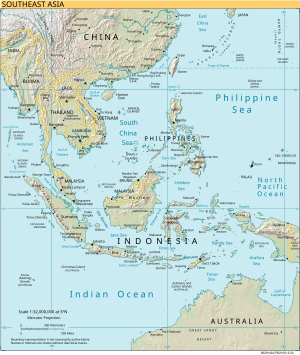 Image via Wikipedia
Image via Wikipedia 05:55 AM Nov 29, 2010
SINGAPORE - An estimated 250,000 women and children are trafficked into South-east Asia every year, often to work in the sex industry.
But human trafficking is more than sexual exploitation, experts said.
It includes forced and child labour, as well as children who are used as soldiers, said experts speaking at the 4th NTS-Asia Annual Convention organised by the S Rajaratnam School of International Studies' Centre for Non-Traditional Security (NTS) Studies last Friday.
It is not for the lack of laws or action plans, but different perspectives on human trafficking from South-east Asian nations that has stymied progress in curtailing human trafficking in this region.
The executive director of the Philippines-based Institute for Strategic and Development Studies, Mr Herman Kraft, said: "There's a separation of human trafficking as an issue, which many Southeast Asian countries see as forced prostitution, and forced labour migration as an issue. You can't separate the two."
As a result, a country's anti-trafficking policies may be skewed towards curbing sexual exploitation but neglect to deal with problems of forced labour migration or child soldiers, he added.
Singapore's role as a destination country for women and girls subjected to forced prostitution - and for some migrant workers into what is perceived to be forced labour - was briefly mentioned.
But NTS researchers Manpavan Kaur and P K Hangzo pointed out that even though Singapore is not a signatory to the United Nations' Protocol to Prevent, Suppress and Punish Trafficking in Persons, Especially Women and Children, it criminalises human trafficking via several means like the Penal Code, Employment Agencies Act and Employment of Foreign Manpower Act (EFMA).
They said: "Penalties prescribed for sex and labour trafficking, including imprisonment, fines and caning, are sufficiently stringent."
The researchers noted that the strict implementation of the EFMA has "reduced illegality" in the labour sector and has come down heavily on employers who fail to pay salaries on time or fail to maintain the foreign workers they have brought in.
Experts concluded that a multi-pronged approach involving source and destination countries, regulating labour recruiters, educating the population and tackling the demand for unreasonably cheap labour, would reduce human trafficking.
Source: Today Online
TODAYonline | Singapore | Human trafficking is more than sexual exploitation: Experts



No comments:
Post a Comment